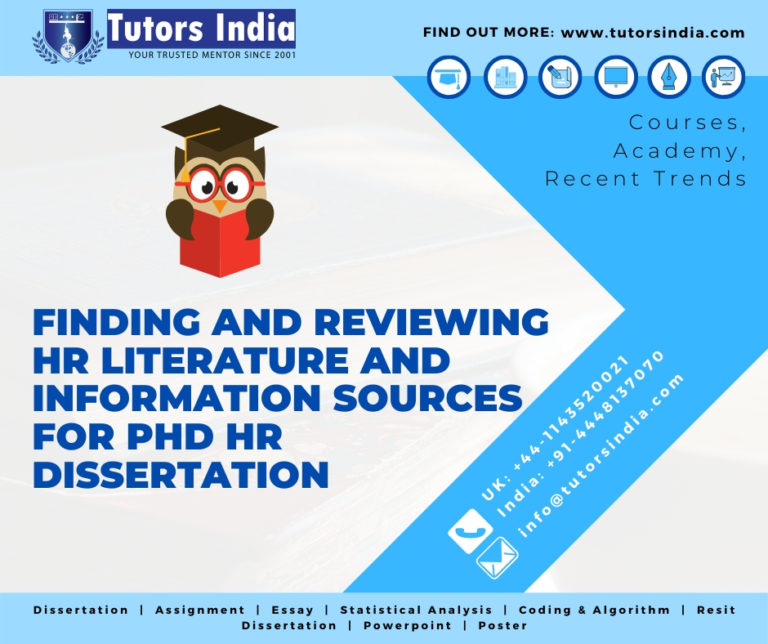Finding And Reviewing HR Literature And Information Sources For Phd HR Dissertation
In Brief
- You will find the best dissertation research areas/topics for future researchers enrolled in Business & Management.
- In order to identify future research topics, we have reviewed the HR literature. (recent peer-reviewed studies).
- First, this article gives you an idea about how to find & review HR literature and information sources for PhD.
- Then, this article provides you with guidelines for finding and reviewing HR Literature.

For a number of research questions, reviewing the literature is the best method to provide answers. Reviewers find useful when the researcher provides the theory that has been evaluated or proof in a certain area or to check the validity or precision of a certain theory (Snyder, 2019).

In the academic world, researchers are encouraged to research and good dissertation writing skills are important. Sometimes viewed as scholarly writing, dissertation writing skills have to be developed as it is not just about expressing thoughts into words. A dissertation needs logic, credibility, conviction, clarity, precision, and cohesion. A dissertation involves creating a text that is not only clear to the reader but is also consistent enough for understanding. There is also literature review help to bring more attention on Business & management
You will find the best dissertation for future researchers enrolled in Business & Management. These topics are researched in-depth at the University of Glasgow, UK, Sun Yat-sen University, University of St Andrews and many more.
PhD students in human resources or any other discipline have to produce a substantial thesis or dissertation as a result of their tertiary pursuit. This is then evaluated by HR experts. In this regard, specific issues like research problems, methodology, data analysis, discussion, and relevant data extracted from previous studies are observed by the examiners. The practice is to ensure that the PhD students fulfill the criteria of being a researcher before they are qualified (Hei, 2019).

Literature Review
The literature review is an essential part of any thesis or dissertation, including journal articles. It is usually written for the benefit of the reader or an examiner who examines the quality of the dissertations and the ability to link previous works to their current study. Most examiners check how the student confers previous works which comprise critiques and evaluations in the student’s own words. Some people consider this a synthesis. The examiners then check for the originality of the work done by the student by reading for the evidence and reviews of others’ works. Most often, the literature review serves as a source of credibility. Also, avail dissertation research proposal, dissertation topic selection, research planning service and more for any research project.
It is the gateway to research as it updates readers about the existing and the past. It reveals the known and unknown facts, the controversial and debatable. (Hei, 2019)
Download our internationalization literature review related Reference book papers such as tutorials, proprietary materials, research projects and many more @ tutorsindia.com/academy/books
Need for Students to Review the Literature
• To expand more knowledge with previous work in one’s field of research and professional interest.
• To grow practice and skill in discovering, reviewing, validating, and integrating information from others’ research work.
• To categorize important unanswered questions, those are based on dissertation topics.
• To know more about methods and approaches to be used in dissertation research.
• To be able to put one’s own research into the framework when writing a dissertation.
• To see examples of good research/academic writing that can be used as a model to follow.
How to find and prepare a literature review:
1. Explore the literature thoroughly, using a well-planned method.
2. Keep track proficiently of the literature that you have found.
3. Read thoroughly what you find. (Don’t just collect.) To help collect the information, take notes in your own words.
4. Categorize the strengths and weaknesses of what you have read.
5. Use others’ literature reviews as an example.
6. Carefully sort out your work.
7. To help readers, including an outline and summary of the topic.
8. Combine points from various references.
9. If you are using others’ words, use quotes for those words.
10. Be sure to mention sources of information.
11. If appropriate, include one or more tables or figures.
12. Use endnotes that tend to be useful for readers.
13. Proofread, and revise the literature review one or more times for accuracy.
Tutors India has vast experience in developing literature review for management students pursuing in UK. Order Now
Approaches to literature review:
There are many existing guidelines for literature reviews. Based on the methodology needed to achieve the purpose of the review, all types can be helpful and appropriate to reach a specific goal. These approaches can be qualitative, quantitative, or have a mixed design depending on the phase of the review (Snyder, 2019).
Table 1
| Approach | Systematic | Semi-systematic | Integrative |
| Typical purpose | Synthesize and compare evidence | Overview research area and track development over time | Critique and synthesize |
| Research questions | Specific | Broad | Narrow or broad |
| Search strategy | Systematic | May or may not be systematic | Usually not systematic |
| Sample characteristics | Quantitative articles | Research articles | Research articles, books, and other published texts |
| Analysis and evaluation | Quantitative | Qualitative/quantitative | Qualitative |
| Examples of contribution | Evidence of effect Inform policy and practice |
State of knowledge Themes in literature Historical overview Research agenda Theoretical model |
Taxonomy or classification Theoretical model or framework |

Finding Literature for review:
It is an explicit, systematic, and reproducible method for identifying, evaluating, and synthesizing the existing body of completed and recorded work of researchers.
In order to identify the sources for literature, we have reviewed the literature review (recent peer-reviewed topics) on HR.
It is divided into seven tasks:
- Select research questions. This is a precisely stated question that guides the review.
- Select bibliographic or article databases or other information sources.
- Choosing appropriate search keywords to get appropriate articles or reports.
- Literature review searches often mean combining keywords and other words such as Boolean operators like, and, or, and not.
- Screening relevant articles from the searches.
- Applying scientific quality evaluation method for screening articles.
- Reviewing the data from the articles.
- Synthesizing the results (Fink, 2019; Ramadass & Aruni, 2019).
Data Analysis
After accomplishing the literature review and choosing a final sample, it is essential to consider how the references will be used to perform the appropriate analysis. That is, after selecting a final sample, a consistent means of extracting relevant data from each article should be used. Data extracted can be in the form of descriptive information, such as authors, years published, topic, or type of study, or in the form of effects and findings (Snyder, 2019).
Assessing the quality of a literature review
Literature reviews for dissertations need to be checked for quality and evaluated as strictly as empirical articles. A quality literature review must have both vigorand severity, that is, it should demonstrate an appropriate method for choosing articles and capturing data and insights and to offer something beyond a recitation of previous research (Snyder, 2019).
Conclusion
- A good literature review is a basis for
- Doing research for a good dissertation.
- Preparing a good dissertation.
- Using the literature well throughout the rest of one’s career.
Therefore the literature review is not a problem for anyone to prevail over, but rather it is an investment to develop knowledge in your field.
References
-
- Fink, A. (2019). Conducting research literature reviews: From the internet to paper. Sage publications. Retrieved from https://books.google.co.in/books?id=0z1_DwAAQBAJ&dq=Fink,+A.,+(2014).+“Conducting+Research+Literature+Reviews:+From+the+Internet+to+Paper”,+Sage+Publications,+2014.&lr=&source=gbs_navlinks_s
-
- Hei, K. C. (2019). Basic and Advanced Skills They Don�t Have: The Case of Postgraduate and Literature Review Writing. Malaysian Journal of Learning and Instruction, 12, 131–150.
-
- Ramadass, P., & Aruni, A. W. (2019). Research and writing across the disciplines. MJP Publisher.
- Snyder, H. (2019). Literature review as a research methodology: An overview and guidelines. Journal of Business Research, 104, 333–339. https://doi.org/10.1016/j.jbusres.2019.07.039

 Previous Post
Previous Post Next Post
Next Post